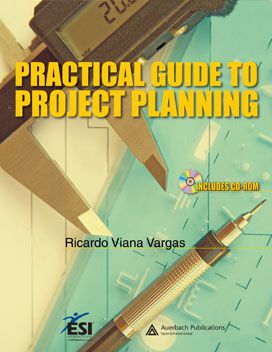About the book
This book was born out of a market need that I could notice since I started my works on project management, as everybody was interested in seeing examples of project documents and discuss and analyze the models and best practices used in the PMI standards, published in the PMBOK Guide.
It's my intention in this book to present, in a direct and practical way, the example of a project that can be analyzed under all management aspects, including the management of scope, time, costs, quality, HR, communication, risks, procurement and integration.
The example exposed in this book concerns the implementation of a project management office (PMO) within a company division, including all the implementation steps, beginning with the diagnosis up to the results achieved. All project documents are presented and discussed in the book, and are available in the attached CD, thus allowing the reader to track and develop his/her own project at the same time he/she reads the book.
I expect all of you to appreciate the book and that it may enhance the work of those already working on projects and that it may allow the beginners to achieve a full understanding of the environment related to the projects.
Good reading, and an enduring success.
Table of contents
PART I - BASIC PROJECT MANAGEMENT CONCEPTS
1. What is a Project?
2. Project Characteristics
3. Project Management Benefits
4. Project Failure Causes
5. Project Life Cycle
6. The Project Life Cycle Phases
PART II – PROJECT PLANNING USING THE PMBOK GUIDE® 3RD EDITION
1. Introduction
2. Breaking Down the Pmbok Guide® 3rd Edition Through Mindmaps®
3. Project Management Areas
4. Integration Management
5. Scope Management
6. Time Management
7. Cost Management
8. Quality Management
9. Human Resources Management
10. Communication Management
11. Risk Management
12. Procurement Management
PART III – PROJECT PLAN DOCUMENTS
1. Introduction
2. Integration Management
2.1. Project Charter
2.2. Preliminary Project Scope Statement
2.3. Project Plan
2.4. Top Level Gantt Chart
2.5. Integrated Change Control System
2.6. Stakeholders Priority Matrix
2.7. Lessons Learned Log
3. Scope Management
3.1. Scope Statement
3.2. Work Breakdown Structure (WBS)
3.3. WBS Dictionary
3.4. Scope Management Plan
4. Time Management
4.1. Activity List
4.2. Gantt Chart
4.3. Leveling Gantt Chart
4.4. Network Diagram
4.5. Milestones Chart
4.6. Schedule Management Plan
5. Cost Management
5.1. Project Task Budget
5.2. Allocated Resources Budget
5.3. Cash Flow
5.4. S-Curve
5.5. Cost Management Plan
6. Quality Management
6.1. Quality Management Plan
7. Human Resources Management
7.1. Organizational chart
7.2. Project Team Directory
7.3. Responsibility Matrix
7.4. Who Does What (Role Diagram)
7.5. Human Resources Management Plan
8. Communication Management
8.1. Communication Management Plan
9. Risk Management
9.1. Risk Management Plan
10. Procurement Management
10.1. Statement of Work
10.2. Procurement Management Plan
PART IV- NEW FRONTIERS PROJECT
